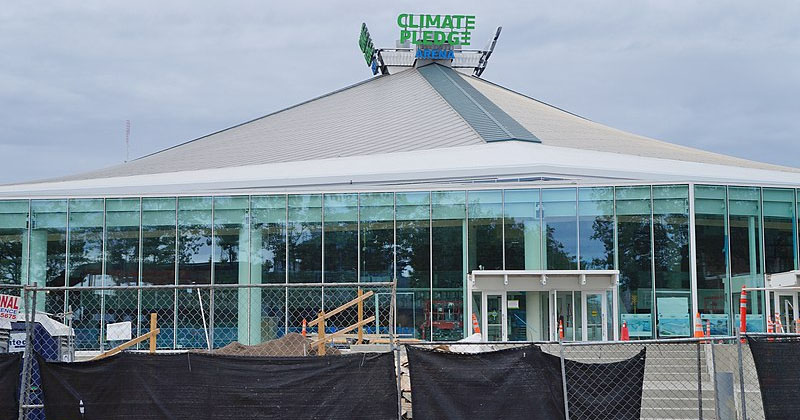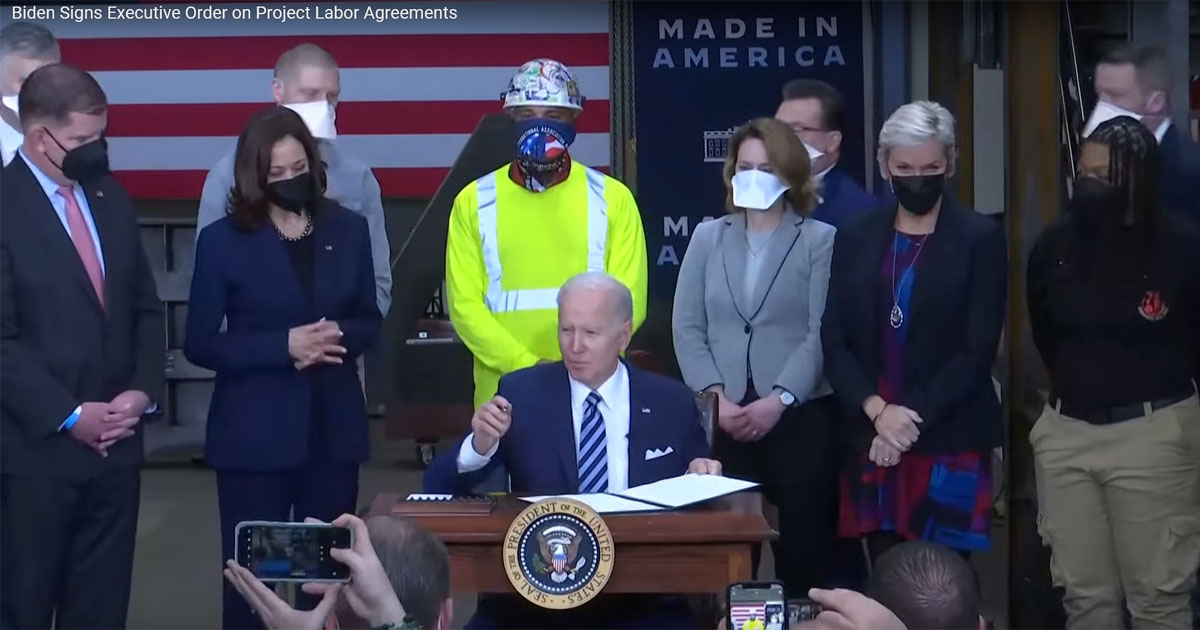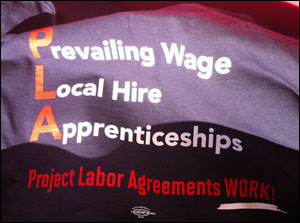OPINION
Everett mayor’s veto of PLA ordinance harms workers, city
By MARK RIKER
(Jan. 11, 2023) — The Everett City Council passed an ordinance on Dec. 7 to require Project Labor Agreements (PLAs) on all city construction projects valued at $5 million or more. PLAs establish the terms of employment for all workers on a project, help control construction costs, ensure efficient completion of projects, and establish fair wages and benefits for all workers. These agreements are commonly used in federal- and state-funded construction and in large private projects like hotels, casinos, and stadiums because they save money, keep projects on schedule, and ensure fair compensation for workers.

PLAs were successfully used for construction of all three of Seattle’s major sports stadiums: Lumen Field, T-Mobile Park, and the new Climate Pledge Arena. They’ve been used by Sound Transit, Sea-Tac Int’l Airport, Naval Base Kitsap-Bangor, and on countless other projects.
The Everett PLA ordinance was the culmination of well over a year’s work with Councilmember Liz Vogeli and almost a year’s work with Councilmember Mary Fosse. Over the many months of working together, the Snohomish and Island Central Labor Council, community members, as well as affiliates of the Washington State Building and Construction Trades Council collected data and carefully crafted a resolution that was later turned into an ordinance.
During the process of the required three readings of this ordinance, rather than amend the ordinance brought forth, opponents brought their own watered-down ordinance that did effectively nothing. It is important to recognize here that all this work is based off a resolution from 2019 that stated that the city should “consider” the use of PLAs. The workers in the city have never benefited from the use of a PLA, despite the non-binding resolution from 2019.
 Everett Mayor Cassie Franklin vetoed the ordinance. In the veto she listed six reasons, most of which were addressed during comment and through the hard work that Councilmembers Vogeli and Fosse did, but no one from the city wanted to listen. In fact, the competing alternative ordinance brought forth by Councilmember Ben Zarlingo, undermined the work done by Vogeli and Fosse to address the mayor’s concerns, and was done with zero consultation from representatives from worker organizations. The resulting bad policy was withdrawn after passage of Vogeli’s and Fosse’s ordinance. The Zarlingo ordinance was opposed by worker organizations and labor universally.
Everett Mayor Cassie Franklin vetoed the ordinance. In the veto she listed six reasons, most of which were addressed during comment and through the hard work that Councilmembers Vogeli and Fosse did, but no one from the city wanted to listen. In fact, the competing alternative ordinance brought forth by Councilmember Ben Zarlingo, undermined the work done by Vogeli and Fosse to address the mayor’s concerns, and was done with zero consultation from representatives from worker organizations. The resulting bad policy was withdrawn after passage of Vogeli’s and Fosse’s ordinance. The Zarlingo ordinance was opposed by worker organizations and labor universally.
In the veto, Mayor Franklin says that the ordinance makes PLAs mandatory with no project-by-project analysis. This is correct. Examining each project is cost prohibitive. The point is to have minimal labor standards on all projects using our public money to employ people on jobs with fair labor standards for the workers. Mayor Franklin states that it is irresponsible to allow this ordinance to go into effect without understanding its impact to the city budget and Everett taxpayers. This work has been done. There are studies, such as this UC Berkeley’s analysis, that show little to no change in cost of a project. The mayor was unwilling to accept facts. It was stated throughout the public process for this ordinance and was ignored.
Mayor Franklin mentioned in her veto that not enough consideration was given to the impact to minority and women owned businesses. PLAs are for workers and are used as tools to help us diversify our workforce. If the mayor is so concerned about the equitable dispersal of city contracts to minority and women owned business, perhaps rethinking the policies the city has for awarding contracts would be an appropriate way to help these businesses, not undermining worker protections.

Last year, President Biden signed an executive order requiring PLAs on federal construction projects over $35 million.
Mayor Franklin also went on to mention the impact to time and completion of projects and the cost of such delays. Data proves the opposite, from a net zero cost difference on such projects with PLAs to no impact on bidder quantity. We dispute their ridiculous assertion that projects will cost 18 to 20 percent more. The data was provided, and again the mayor was unwilling to accept documented facts. As Vogeli stated during her comment time, most of the referenced data provided by the mayor’s staff were from right-wing Koch Brothers-backed organizations.
The mayor stated that the ordinance was adopted without a comprehensive review of the legal risks and vulnerabilities. As this ordinance is based off of the mayor’s 2019 PLA resolution, why wasn’t this done then? In fact, Vogeli and Fosse did vet their ordinance through the legal department. The final concern listed talks of using an index to inflation, but these are not commonly used to decide thresholds for PLAs.
The only conclusion that can be made here is that the mayor, despite her promulgations, does not support workers. In fact, during this process, the mayor’s administration reached out to building trade affiliates and tried to convince them not to work with council on this, yet now she insinuates that she is pro worker?
 The Everett city councilmembers that were involved in this process did the research, collected the data, researched best-known methods and presented it as an ordinance. Some amendments were made on the third reading and they were good-faith amendments that were meant to alleviate some of the city’s main concerns. Effectively, with the amendments, no projects in 2023 would even be covered under the approved amended ordinance. So what’s the problem? You have loads of time to come up with a master agreement and get it right.
The Everett city councilmembers that were involved in this process did the research, collected the data, researched best-known methods and presented it as an ordinance. Some amendments were made on the third reading and they were good-faith amendments that were meant to alleviate some of the city’s main concerns. Effectively, with the amendments, no projects in 2023 would even be covered under the approved amended ordinance. So what’s the problem? You have loads of time to come up with a master agreement and get it right.
Don’t be fooled by the mayor’s tactics. They oppose family wages and meaningful apprenticeship pathways. This is not effective or responsible leadership. This veto wasn’t done for the betterment of our community and the workers of Everett, which was the purpose of the council-passed PLA ordinance. The veto was anti-worker and everyone needs to know that.
It seems that unfortunately the mayor listened to a very specific interest group that is opposed to PLAs and Community Workforce Agreements (CWAs) and their self-serving interpretation convinced her to turn her back on the working men and women of the City of Everett.
PLAs and CWAs are complex project delivery mechanisms that can and do provide great benefit to workers and businesses in a local community alike. Mayor Franklin chose not to take advantage of those benefits for the people she has been elected to represent.
 Mark Riker is Executive Secretary of the Washington State Building & Construction Trades Council, AFL-CIO. Learn more at www.wabuildingtrades.org. This column was originally published in The (Everett) Herald and is posted here with the author’s permission.
Mark Riker is Executive Secretary of the Washington State Building & Construction Trades Council, AFL-CIO. Learn more at www.wabuildingtrades.org. This column was originally published in The (Everett) Herald and is posted here with the author’s permission.





